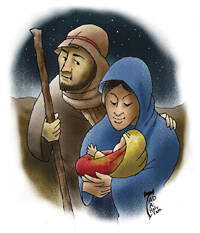Fleeing for Life
Four years ago, Fermina López, a native of Guatemala, found herself divorced, homeless and jobless, with three children to raise. She felt she had no choice but to flee her beloved homeland and make the perilous journey north in search of work. She was one of the lucky ones who survived the five-day trek across the desert and found employment in Phoenix. When she was able to save enough money for smuggler fees, she sent for her children one by one, whom she had left in the care of her neighbors. The first two made it, but her youngest, who got as far as the U.S.–Mexican border in July, is now feared dead. The Lopez family is one small unit among the 214 million international migrants in the world today, a number that has doubled in the last three decades. Not all have achieved their dreams for a life no longer threatened by death from political opponents or military regimes or inadequate economic resources.
Today’s Gospel tells of Joseph’s dream, in which a divine messenger relays Herod’s intent to kill the infant Jesus. The angel instructs Joseph to flee with Mary and the child to Egypt, a traditional place of refuge for Israelites (e.g. Gn 42–48; 1 Kgs 11:40; Jer 26:21). They too faced a treacherous desert crossing, though the Gospel tells none of those details. We can only imagine Mary and Joseph’s fear as they stole away under the cover of darkness and all the hardships they endured. Matthew says nothing about what happened when they arrived in a strange place, having to navigate an unfamiliar language and culture. Who helped them along the way? How did Joseph find work? What did Mary think about Joseph’s dreams?
The evangelist skips ahead to the holy family’s departure from Egypt, quoting Hos 11:1, “Out of Egypt I called my son.” As he is wont to do, Matthew interprets all that happens in the life of Jesus as fulfillment of Scripture. By identifying Jesus with Moses and the Exodus, he introduces the theme that Jesus is the new authoritative teacher of the law.
Just as Moses received a divine command to return home after the death of those who sought his life (Ex 4:19), so Joseph follows the angel’s command to return home after the death of Herod the Great. Herod’s sons, however, still pose a threat. Archelaus, the eldest, inherited Judea, Samaria and Idumea, which he ruled for 10 years (4 B.C.–A.D. 6). Philip governed the area north and east of the sea of Galilee, and Herod Antipas controlled Galilee and Perea. Archelaus was no less cruel than his father, so Joseph is fearful of returning to Judea. Once again he is directed by an angel in a dream, and he settles his family in the more peaceful Galilee. It may have been the availability of work in Sepphoris, the city being built by Herod Antipas as his capital, that led Joseph to settle his family in Nazareth, some four miles away.
As usual, Matthew interprets this move as fulfillment of Scripture. Matthew’s meaning is puzzling, however, since there is no text in the Scriptures that says, “He shall be called a Nazorean.” It is likely that he intends an allusion to Is 11:1, which speaks of a shoot (netzer) that will sprout from the stump of Jesse, thus highlighting Jesus’ royal Davidic lineage.
The experience of the holy family of having to flee for their lives into a foreign land can give strength and courage to millions of today’s migrants. Those living in the host country are challenged by the Gospel to consider what kind of welcome they would want to offer to newcomers if they were none other than Jesus’ own family.
This article also appeared in print, under the headline “Fleeing for Life,” in the December 20, 2010, issue.








